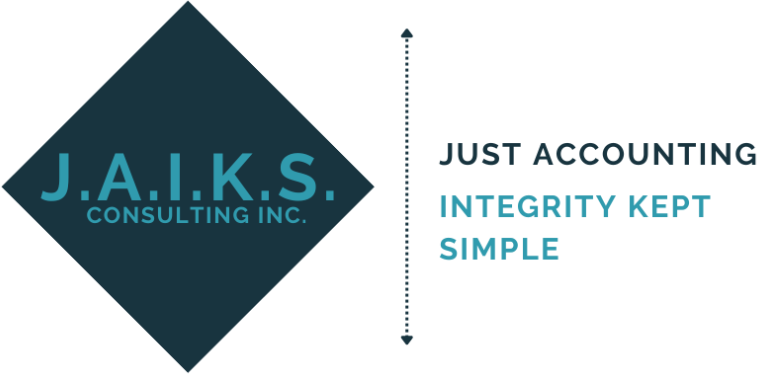J.A.I.K.S. BLOG
Welcome to J.A.I.K.S. Blog, a place where we will provide you with a variety of resources on accounting, taxation and other related subjects suited for both individuals and/or their businesses.
We hope you can find the answers to your questions and/or curiosities, and always know we are here to help if you need more.
Follow us on Facebook or find us on LinkedIn - we are always eager to give you more!
Disclaimer:
The content provided in this blog is for general informational purposes only and is not intended as professional accounting, tax, or financial advice. While efforts are made to ensure the accuracy and timeliness of the content, errors or omissions may occur. The content does not constitute a client-advisor relationship. Readers should consult with a Chartered Professional Accountants or other financial professional for advice tailored to their specific needs. We are not liable for any actions one might take based on the information provided in this blog.
3 minutes reading time
(679 words)
New T3 Requirements for Joint Accounts
Should you have established an in-trust-for (ITF) account for your minor child or hold specific assets jointly, such as a joint bank account or being added to the title on a home, you, and/or they, may now fall under the purview of recently implemented trust reporting regulations, effective for taxation years ending after December 30th. These regulations might necessitate the filing of a T3 Trust Income Tax and Information Return within 90 days of the year-end, irrespective of whether there's any income or activity to report. Given that trusts typically have a calendar year-end, the first tax return for 2023 would be due by April 2, 2024 (as March 30 falls on a Saturday, and April 1 is Easter Monday). Perhaps you have heard about this new trust reporting and do not know if it applies to you, please feel free to contact us. More information is below regarding the new trust reporting.
Should you have established an in-trust-for (ITF) account for your minor child or hold specific assets jointly, you, and/or they, may now fall under the purview of recently implemented trust reporting regulations, effective for taxation years ending after December 30th. These regulations might necessitate the filing of a T3 Trust Income Tax and Information Return within 90 days of the year-end, irrespective of whether there's any income or activity to report. Given that trusts typically have a calendar year-end, the first tax return for 2023 would be due by April 2, 2024 (as March 30 falls on a Saturday, and April 1 is Easter Monday).
A common concern expressed by senior clients is the wish to avoid probate fees upon their passing. Jointly held assets, which bypass probate and its associated fees, are often pursued as a solution. Thus, elderly parents frequently opt to include adult children as joint title holders to bank accounts or the family home.
In doing so, the parent typically establishes a bare trust, with the adult child acting as a trustee, themselves as settlor, and sole beneficiary. The adult child's role is merely to hold legal title to the property and cannot take action without the parent's instructions as the beneficial owner.
In 2022, the federal government indicated that bare trusts would fall under the new trust reporting rules, effective from the 2023 calendar year. Although historically ignored for income tax purposes, these trusts are now subject to annual T3 trust return filings.
Exceptions to the new rules exist for certain trusts, potentially including bare trusts in specific scenarios, such as if the trust is less than three months old at year-end, or if it holds assets valued at $50,000 or less, limited to money, government bonds, and publicly traded securities.
The updated reporting regulations significantly expand the information required in the T3 return. Trusts are now obligated to provide comprehensive details about trustees, beneficiaries, settlors, and individuals with authority over trust decisions, such as trust protectors. This includes their personal information like names, addresses, dates of birth, residency jurisdictions, and taxpayer identification numbers. Moreover, the reporting must encompass beneficiaries whose identities are unspecified at the time of filing, such as unborn children or grandchildren.
Notably, the definition of "settlor" encompasses individuals or partnerships that have loaned or transferred property to the trust's benefit, directly or indirectly. This broad definition may include individuals employing common Canadian tax and estate planning strategies, like estate freezes, or those contributing nominal amounts to trusts without arm's length dealings.
Noncompliance with the additional reporting requirements incurs new penalties. Failure to file a T3 return as mandated results in penalties equal to the greater of CA$2,500 or 5% of the trust's highest total fair market value of held property in the year. These penalties also apply to knowingly false statements or omissions, or those made under circumstances of gross negligence. For Québec tax purposes, the 2021 Québec budget proposed a penalty of CA$1,000 plus $100 for each day of non-filing, capped at CA$5,000.
As this can be complicated, or, to ensure that you are meeting the compulsory filing requirements, please contact our office for our assistance.
Stay Informed
When you subscribe to the blog, we will send you an e-mail when there are new updates on the site so you wouldn't miss them.


Comments